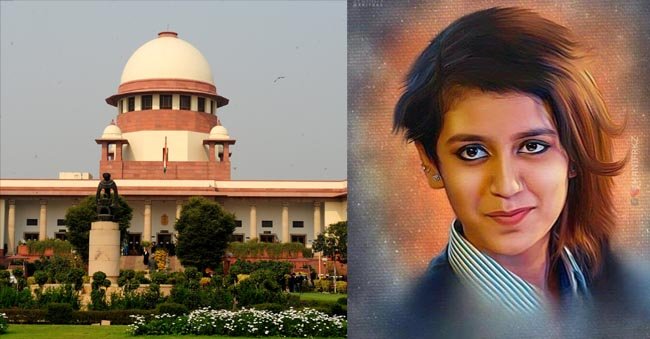The Supreme Court on Friday quashed the FIR against Malayalam actress Priya Prakash Varrier and director Omar Lulu of the film ‘Oru Adaar Love’ (yet to be released) for hurting the religious sentiments of the Muslim community.
The entire controversy stems from the picturisation of the song ‘Manikya Malaraya Poovi’, a traditional Muslim song from the Malabar region of Kerala in the film. The song, originally written in 1978 by PMA Jabber and composed by Thalassery K Refeeque, describes and praises the love between the Prophet Mohamed and his first wife Khadeeja. A clip from the song, featuring the actress, went viral on social media primarily because of her wink.
Thereafter, complaints had been lodged in Maharashtra and Telangana against the actress and director of the film for allegedly hurting sentiments of the Muslim community through the song. Further, in February, Falaknama Police Station, Telangana registered an FIR against the actress and film director under section 295A of the IPC. This update can be read here.
Consequently, Varrier and Lulu moved the Hon’ble Supreme Court of India under Article 32 of the Constitution of India seeking quashing of the FIR, amongst other reliefs. In their petition, the petitioners had asserted that the complaints filed by the various fringe groups were based on a distorted interpretation of the song in the non-Malayalam-speaking states. This update has been covered here.
Apparently, in April 2018, two Hyderabad residents approached the Supreme Court seeking a direction to remove the song in question from the film, claiming that winking was “blasphemous” in Islam.
The matter came up for hearing before a three-judge bench of the Supreme Court comprising of the Chief Justice of India (CJI), Dipak Misra, Justice AM Khanwilkar and Justice DY Chandrachud.
The bench ruled that the picturisation of the said song solely because of the ‘wink’ will not be hit by Section 295A of the Indian Penal Code that deals with “deliberate and malicious acts, intended to outrage religious feelings or any class by insulting its religion or religious beliefs”.
It added that “the said song has been on YouTube since February 2018” and “we do not perceive that any calculated tendency is adopted by the petitioners to insult or to disturb public order to incite the wrath of Section 295A of IPC”.
The bench heavily relied on the 1957 constitution bench judgment in Ramji Lal Modi vs. State of U.P. A.I.R. 1987 SC 620, which held that section 295A only punishes “an aggravated form of insult to religion when it is perpetrated with the deliberate and malicious intention of outraging the religious feelings of that class”.
The court observed that the FIR was lodged in all possibility “to gain mileage”.
Reportedly, CJI Dipak Misra reprimanded the complainant and said, “Somebody in a film sings a song and you have no other job but to file a case?” CJI Dipak Misra further added that audiences should watch movies with maturity, honesty and intellectual tolerance.
Allowing the writ petition, the bench quashed the FIR lodged against the petitioners in Telangana and further directed that no FIR or criminal complaint should be entertained against the petitioners because of the picturisation of the song. The order can be read here.
Image Source: Here













